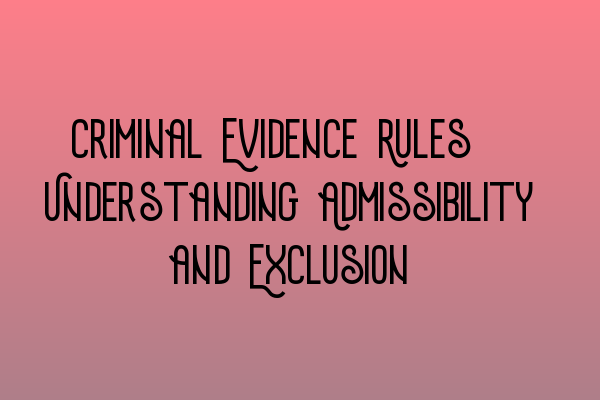Criminal Evidence Rules: Understanding Admissibility and Exclusion
Welcome to the SQE Criminal Law & Practice Law UK blog! In this article, we will provide you with a comprehensive understanding of criminal evidence rules, specifically focusing on admissibility and exclusion.
What are Criminal Evidence Rules?
Criminal evidence rules are the legal principles that govern the admissibility and exclusion of evidence in criminal proceedings. These rules ensure fairness, reliability, and the protection of individuals’ rights throughout the legal process.
Admissibility of Evidence
The admissibility of evidence refers to whether the court allows certain evidence to be presented during trial. Courts follow specific criteria to determine whether evidence should be admitted. The most common criteria include:
- Relevance: The evidence must have a logical and material connection to the issues being considered in the case.
- Reliability: The evidence should be trustworthy and free from any significant flaws or biases.
- Hearsay: Hearsay evidence is generally not admissible unless an exception applies. Hearsay refers to statements made outside of court that are offered for the truth of the matter asserted.
- Privilege: Certain communications, such as those protected by solicitor-client privilege, may be excluded from evidence.
Understanding the rules that govern the admissibility of evidence is crucial for criminal law practitioners. If you’re preparing for SQE 1 or SQE 2 exams, make sure to check out our related courses and practice materials:
- SQE 1 Practice Exam Questions
- SQE 1 Practice Mocks FLK1 FLK2
- SQE 2 Preparation Courses
- SQE 1 Preparation Courses
- SRA SQE Exam Dates
Exclusion of Evidence
The exclusion of evidence refers to situations where the court decides to exclude certain evidence from being presented or considered during trial. Some common reasons for the exclusion of evidence include:
- Improperly Obtained Evidence: Evidence obtained in violation of an individual’s constitutional rights or through illegal means may be excluded.
- Unfair Prejudice: Evidence that is highly prejudicial or likely to mislead the jury may be excluded to ensure a fair trial.
- Inadmissible Character Evidence: Evidence of a person’s character or disposition to prove their conduct in a criminal case is generally inadmissible, with some exceptions.
- Opinion Evidence: Opinions of witnesses are generally excluded unless they are qualified experts or provide lay opinion evidence based on firsthand perception.
It’s important to understand the grounds for exclusion of evidence as it can significantly impact the outcome of criminal trials.
Concluding Thoughts
Understanding the criminal evidence rules regarding admissibility and exclusion is crucial for legal professionals practicing criminal law. It ensures that only relevant and reliable evidence is considered in court, promoting fairness and justice.
If you found this article helpful, don’t forget to explore our related articles and resources:
